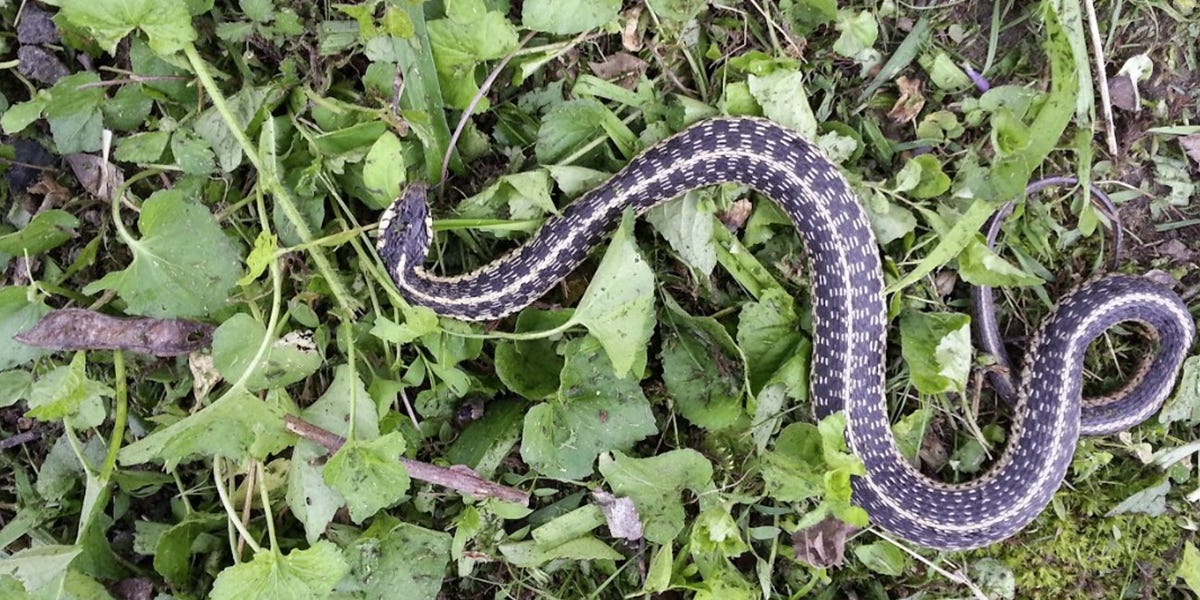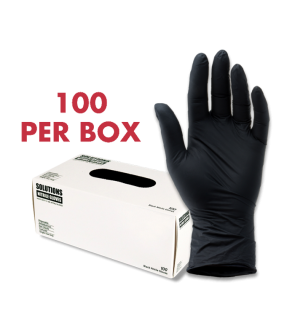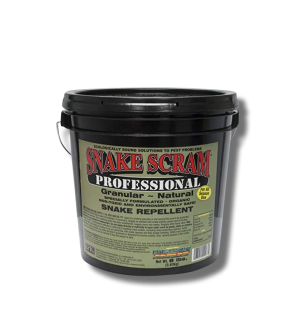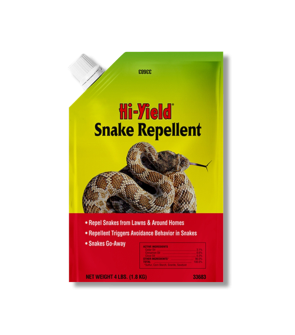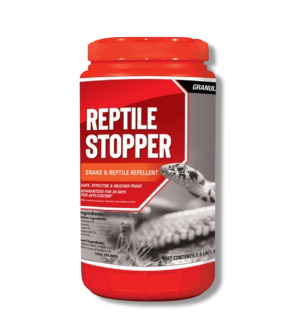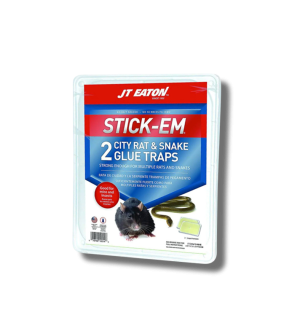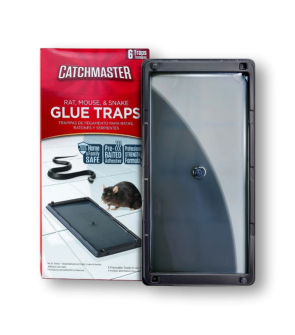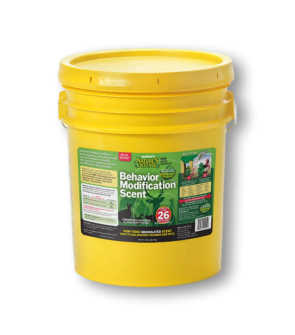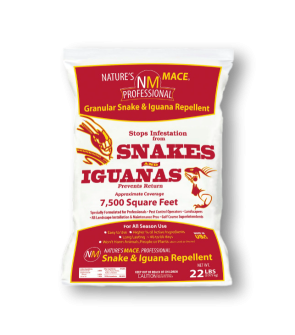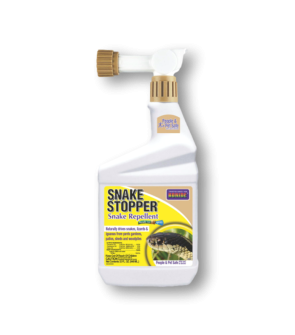Gain access to personalized product screening, the best pricing, rewards, and more!
Most Effective Products
Snake Control: How To Get Rid of Snakes
This page is a general snake control guide. Using the suggested products and methods will lessen the likelihood of snakes on your property. Follow this guide and use the recommended products, and we guarantee a great reduction in your Snake population.
If you think the snake you're dealing with might be venomous, you should call an animal control specialist without hesitation. Even if you think it might not be venomous, calling for professional help is always preferable. Animal control will easily trap and remove the snake from your premises.
Snakes are among the most startling discoveries you can make in your home or place of business. They are especially problematic when they are aggressive and carry venom.
Snakes are distinctive and very recognizable to people due to their unique traits. They can vary greatly in color from black to red, green, and many other colorful patterns in between. Some species of snakes are extremely dangerous, and their bites could prove fatal to humans. In the United States alone, four venomous snakes can cause serious injury or prove fatal to humans. These snakes are rattlesnakes, copperheads, cottonmouths, and coral Snakes.
While most species of snake prefer habitats out in the wild, they can venture into residential areas when looking for food. Snakes will likely visit your lawn if your yard has lots of debris, logs, rocks, woodpiles, and harborage areas where they can hide. This is even more likely if your backyard has moisture or parts that don't drain well, as this will attract frogs, lizards, birds, and other small animals that snakes can feed on.
If you have found a snake in your home or yard, don't panic! The following DIY guide can help you to safely eliminate the threat of a snake on your property the way a professional would.
Identification

Identification is extremely important to applying control. Before you can treat, you need to make sure you're dealing with non-venomous snakes or a possibly venomous snake. Since their appearance is widely known, we'll describe the common characteristics of the four types of snakes that are venomous in the United States.
- Rattlesnakes may have different colorings or patterns, but they are easily identifiable by their rattles or tails, which they shake when they feel threatened. The peculiar trait of having rattles for tails makes these snakes unique.
- Copperhead snakes can vary in color from reddish to golden tan. They can be identified by the patterns on their body, which are usually hourglass-shaped. They usually measure from 18 to 36 inches in length.
- The Cottonmouth or Water Moccasin is nearly 50 to 55 inches long. Its color could vary from dark tan to brown to black. The shapes in its body are often vague or faded but usually look like crossbands. They are most frequently found near or inside water.
- Coral snakes are relatively thin and are about 24 inches long (or 2 feet). They are often confused with nonvenomous king snakes with the same coloring or pattern. Look at the patterns to distinguish a coral snake from a king snake. If the red bands touch the yellow bands, it is a venomous coral snake. They are most commonly found underneath leaf piles, logs, rocks, and under the ground.
- There are also several black snakes, such as the black swamp snake, black rat snake, ring-necked snake, black pine snake, eastern indigo snake, and southern black racer. These snakes vary slightly in appearance but are mainly black.
We suggest you avoid snakes and call animal control to remove them from your property if you encounter any snakes. However, many species of snakes are venomous (ranging from slightly to highly venomous), and their appearance will vary greatly. Most species can deliver painful bites.
If you believe the snake you're dealing with is venomous, contact animal control immediately. They will easily trap and remove the snake from your premises. However, if you want to handle it on your own, continue with this guide.
Inspection
After identifying the snake on your property, you can move on with an inspection to find out exactly where the snakes are visiting your property or where they are harboring. During the inspection, you will focus on finding these problem areas around your home.
Where To Inspect
Most snakes will be found outdoors, so begin your inspection there. Search your yard or property for yard debris, leaf litter, woodpiles, logs, rocks, burrows (or holes in the ground), dense vegetation, flower beds, and trees. If they have ventured indoors, they may have come up from the plumbing or toilet. They also might hide inside cracks and crevices, behind furniture, in appliances, or in any room in the home.
What To Look For
In the yard, you're looking for harborage areas and the snakes themselves. All the places mentioned above in your yard will provide adequate shelter. Search in the places mentioned above, but if there's a snake indoors, they will make their presence known. Once you have confirmed snake activity, you're ready to apply treatment.
Treatment
Once you have confirmed snake activity, it is time to begin treatment. Remember to read all product labels, follow the application instructions on these labels, and wear personal protective equipment (PPE) to stay safe.
If you encounter a snake, do not try to take matters into your own hands and kill the snake because you may get bitten by the snake during your attempt. If you do not see the snake but know they are around, they can be deterred from your yard with the help of a snake repellent such as Reptile Stopper Granular Repellent.
Step 1: Remove Food Sources
If snakes are staying on or around your property for an extended period of time, there are likely ample food sources nearby. Removing any food source that may attract snakes is crucial for controlling and preventing snake invasions.
Snakes, such as black snakes, like to eat small rodents, birds, insects, and lizards, so first, remove all of these food sources to help ward off invasive snakes.
To control rodents in your yard, use Eratication Rodent Bait inside tamper-resistant Solutions Rodent Bait Stations. Eratication is a powerful multi-feed rodenticide bait used to control rats and mice. It is also peanut butter-scented to attract rodents to the bait.
Wear gloves when handling bait and stations. Gloves are important for safety and keeping human scent off the stations, which deters rodents and makes them shy to try bait. Place 2 to 3 Eratication bait blocks into your station. Each bait block has a pre-drilled hole, allowing you to easily slide it onto the supplied metal rods in the bait station's interior.
Place your rodent bait stations along perimeter walls or fence rows. These are areas where rats and mice typically travel. Place each station about 10 to 15 feet apart to ensure thorough coverage of your area. Check the stations frequently to see if there is any rodent activity.
Step 2: Apply Supreme IT Insecticide
Supreme IT is a broad-spectrum insecticide labeled for treating over 70 different insect pests. It also has a long residual effect that kills for up to 90 days after application.
To apply Supreme IT, simply mix it with water in a handheld pump or hose-end sprayer.
Apply Supreme IT at a rate of 1 oz. per gallon of water to cover 1,000 sq. ft.
To accomplish uniform control when applying to dense grass foliage, use volumes of up to 10 gallons per 1.000 sq. ft. Measure the square footage of your lawn to determine how much Supreme IT you need to cover the entire area. Shake well and pump your sprayer.
Broadcast the Supreme IT mixture and spray your yard and garden instead of spot-treating. Use a fan spray setting to get nice uniform coverage.
Next, you should spray a perimeter treatment of Supreme around the outside of your home and structure to create a barrier that will keep beetles out. Spray around doors and windows, around the foundation going up 2 or 3 feet, and then spray any other possible entry points.
Step 3: Apply Snake Repellent
Once you have removed all the sources of food near your home and garden, the next step is to utilize a snake repellant like the Reptile Stopper Granular Repellent.
This product will not kill the snake but disturb it with its special blend of natural ingredients, which irritate the snake's sense of smell to the point that the snake will leave your property.
Apply Reptile Stopper Granular Repellent liberally to dens, tunnels, entry points, and around plants that need protection. When applying near plants or crops for consumption, apply this product as a perimeter treatment.
Reapply Reptile Stopper Granular Repellent as needed every 30 days.
Prevention
You don't want them returning once you have removed the snake threat on your property. Consider the following preventative measures to ensure you don't experience a snake slithering onto your property again.
- For starters, keep your grass short. Frequently mow your grass to reduce the likelihood of snakes hiding in your lawn. Remove and clean general clutter and yard debris inside your property. This includes leaf litter, woodpiles, logs, rocks, and tree stumps.
- Keep trees and bushes well-groomed by trimming them often and cutting them short and away from your property. Get rid of bird feeders, which oftentimes provide them feed when the seeds are spilled.
- Seal cracks and crevices in the foundation of your structure and fix and repair holes in your fence if you have one (if you do not have one, adding a fence can also greatly reduce the likelihood of encountering snakes).
- Use caulking, copper mesh, or pest control foam to seal holes and openings in your foundation to lessen the entry points where they can enter your structure.
Key Takeaways
What are Snakes?
- Snakes are small to medium-sized reptiles known to venture onto residential properties when hunting for food.
- Various species of snakes can be venomous. If you're unsure if your snake is venomous, contact animal control to get them off your property.
How To Get Rid of Snakes From Your Property
- Snakes trespassing on your property is usually an indicator that you have a rodent problem. Removing them with rodenticides and insecticides like Supreme IT Insecticide will remove a snake's food supply.
- Always exercise extreme caution when dealing with snakes. Keep your distance at all times, and never handle them without a broom or stick.
- Use a snake repellent, such as Reptile Stopper Granular Repellent, around your yard and perimeter to prevent and deter snakes from entering the area.
Preventing Snake Reinfestation
- An important part of controlling snakes is making your yard less appealing to them through environmental modifications. Some of these modifications would include mowing your grass short, clearing up leaf litter, and getting rid of food sources.
- Limit the chances of trespassing into your home by sealing all entry points with caulk and Stuf-Fit Copper Mesh.






